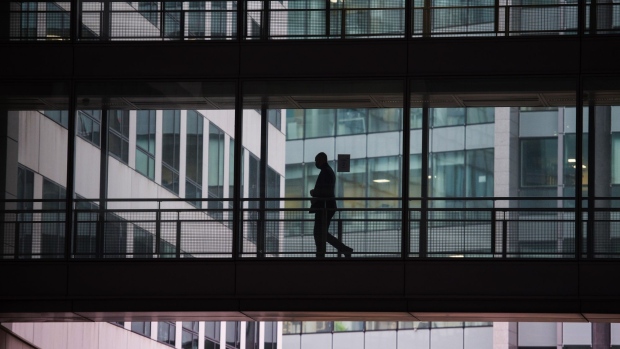Feb 23, 2021
Masks, Distancing Top Covid Testing to Keep Businesses Open
, Bloomberg News

(Bloomberg) -- Business leaders plotting ways to bring their employees safely back while awaiting protective Covid vaccines might turn to Mercury Systems Inc. for guidance.
The supplier of electronic systems for the aerospace and defense industries used measures including air filtration and expanded sick leave to prevent workplace transmission of the coronavirus even as the pandemic surged in the community.
Safety strategies at the Andover, Massachusetts-based company, such as mandatory mask-wearing and physical distancing rules, may provide a model for other firms, according to a study published Monday in the journal Open Forum Infectious Diseases.
“This company never closed down, but employed these mitigation measures from the beginning and had great results in that very few illnesses from Covid-19 occurred across a large workforce,” said Monica Gandhi, a professor of medicine at the University of California, San Francisco, who helped write the research. “This study has implications for how to bring employees back to the workplace” while Covid shots roll out, she said.
Early Response
In late February 2020, Mercury stopped international travel and asked employees to quarantine after all trips, including those within the U.S. Weeks later, it restricted all travel and non-essential visitors, including for job interviews and new hires.
By mid-March, Mercury issued a mandatory work-from-home policy to more than half its employees. The directive excepted staff who were needed at its factories in Arizona, California and New Hampshire.
Mercury increased sick-leave allowances and overtime pay while establishing an emergency support fund for employees to reduce stress, according to the study. Periods of isolation and quarantine for those with Covid-19 or exposed to cases were fully paid.
“Providing sick-leave pay during this pandemic is extremely important to encourage employees to stay home who have symptoms of Covid-19 or any other illness,” Gandhi said in an email.
About 10% of 586 employees stayed home for respiratory symptoms that could be consistent with Covid-19 from March to August. Staff were encouraged to report any significant illness to the company, and only four reported severe illness from Covid-19 requiring hospitalization over the six-month study period.
One-Way Paths
In April, Mercury started upgrading its facilities, including designating one-way walking paths where possible, installing no-touch hardware in restrooms and on doors, increasing airflow via HEPA filters, and putting plexiglass shields between workbenches.
By mid-April, Mercury strongly encouraged face masks at all facilities and during personal or outside-work activities. On April 22, the company began distributing KN95 masks at all sites to facilitate compliance. By May 26, mask-wearing with the distributed masks became mandatory for all employees at all sites, and compliance was monitored.
Mercury also commenced mandatory daily symptom screening for on-site employees. Nurses performed the screening at first, and then the company added a kiosk added for self-screening.
Surveillance screening for Covid-19 began across all three manufacturing sites in July and August. Of the 586 employees, 44 had a positive test for SARS-CoV-2. Of 105 individuals with positive or inconclusive tests, 99% were asymptomatic at the time of testing. Positivity rates were consistent with community prevalence at the time, the researchers said.
They found that routine testing wasn’t necessary to prevent Covid-19 “as masking and distancing served as adequate non-pharmaceutical interventions to prevent illness,” Gandhi said.
Other measures Mercury took include:
- adjusted schedules for on-site employees and increased spacing in offices, conference rooms, and production workbenches to reduce worker density;
- required employees to consume food in conference rooms at least 8 feet apart;
- created guidance for physical distancing, frequent hand hygiene, personal protective equipment usage, and exposure protocols;
- asked employees to self-isolate in the event of any symptoms that could be consistent with Covid-19;
- undertook “deep cleaning” on a monthly and as-needed basis.
Karen Haigh, a chief fellow technologist at Mercury, also co-authored the paper. To date, all facilities have remained open and productive through the pandemic, according to an e-mailed statement from the company.
“We continue to take the necessary proactive steps to prepare for and respond to the coronavirus pandemic,” Mercury said. “Putting our employees at the center of our decision making has proved to be the right thing to do for all the company’s stakeholders.”
©2021 Bloomberg L.P.





